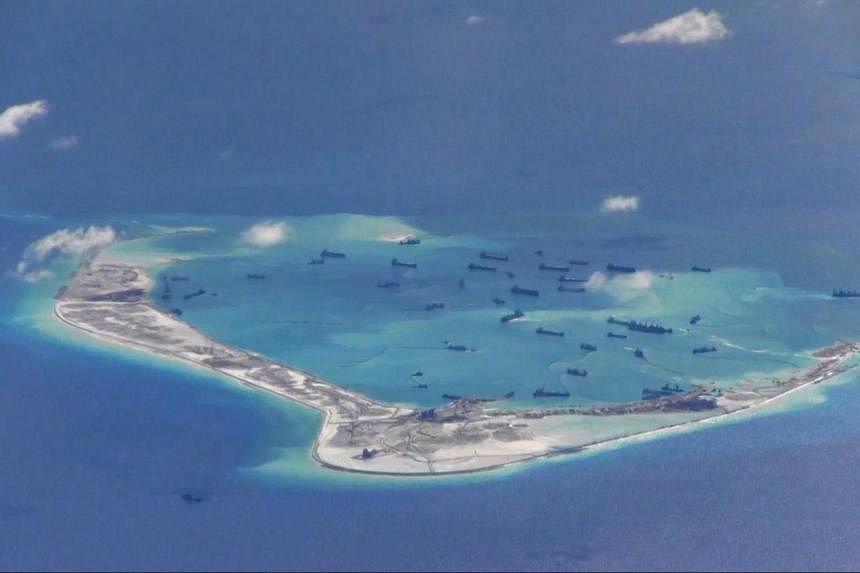As an English-language daily newspaper in Singapore, a modern country with leaders who are often vocal about the need for the United States to remain active in Asia, to "balance" the growing clout of China, we are sometimes subject to hard scrutiny for our editorial choices.
People read our articles to try to figure out our stance, or even that of the government.
Good luck to them.
Just to be clear: The Straits Times Editorial states clearly the newspaper's position on an issue.
But in our Opinion pages, we do not insist that all views accord with our own, nor do we necessarily agree with them all.
Rather, we seek to foster debate on the issues by offering a wide range of perspectives.
We routinely carry commentaries one day that can be seen as pro-one-camp or another; and viewpoints on another day that debunk that view.
This does not mean we will run any viewpoint. But if it is well-argued, does not stoke primal feelings unduly, and is from someone with deep insights into an issue - and written accessibly - we are prepared to run it.
Take the ongoing tension in the South China Sea. Tensions are rising between China and the United States, after the US sent a surveillance plane flying over the South China Sea on May 20, above disputed land masses on which China has reclaimed land and built installations. The Chinese reportedly warned off the plane at least eight times, once with the rather plaintive appeal:
"Please go away … to avoid misunderstanding."
The US pilot is reported to have responded: "I am a United States military aircraft conducting lawful military activities acting outside national airspace. I am with due regard in accordance with international law."
A few days after that incident, the Chinese released a white paper on military strategy.
Depending on what media you follow, you would think the paper is all about asserting Chinese military might and a resurgent Chinese navy. Or you might think the paper is a wonderful statement of Chinese desire for transparency to avoid misunderstanding.
If you are smart enough to subscribe to The Straits Times, though, you would get both points of view, here.
And while much commentary on the paper centred on China's projection of its naval power, and its shift from "offshore waters defence" to "open seas protection", one analyst who wrote for The Straits Times had a very different take.
The most striking thing about the paper, he said, was the way it asserted that the military would follow the leadership of the Communist Party of China and its leadership. And the picture that emerges is of a China trying to balance between becoming militarily strong and keeping the peace. Noted Greg Austin, a visiting professor at the University of New South Wales in Canberra, in a piece written for The Straits Times: "One Chinese commentator says the new strategy paper has signalled support for the dual- track strategy of Chinese Premier Li Keqiang, who China wants to partner with Asean to manage regional security, while working to resolve disputes between the two sides.
"But the strategy has the stamp of President Xi Jinping all over it - the China dream, an appeal to revolutionary values, and mixed signals about the balance between making China militarily strong and keeping the peace."
Those following the news on US-China relations would have asked at some point this week, whether the US and China will go to war. If the US sends planes flying over islands claimed by China (and other rival claimants); will the Chinese lose patience one day and take action? Will the US deploy forces to block or prevent, Chinese actions?
On this, Australian academic Hugh White is very clear: do not underestimate China's resolve to go to war. No, he is not a war-mongering alarmist. The respected professor from the Australian National University in Canberra is a realist, a vocal advocate of the school of thought that America can no longer go it alone as the region's super cop, and has to learn to share power with a "concert of Asia" that must include China, Japan and India.
Prof White does not mince his words.
This is his reading of the situation: "It seems likely that China would be more willing than the US to allow a crisis in the South China Sea to escalate into a war. If so, America's assumption that China can be deterred from staking its claims to regional leadership in the South China Sea by minor infringements of its claimed air and sea space is a dangerous and outdated delusion."
You might read his viewpoint and be convinced that war is a matter of when and how serious, not if.
Until a few days later, of course, when you read another view contradicting that.
All in a week's reading, in The Straits Times.
Chua Mui Hoong blogs weekly on notable commentaries and issues.


